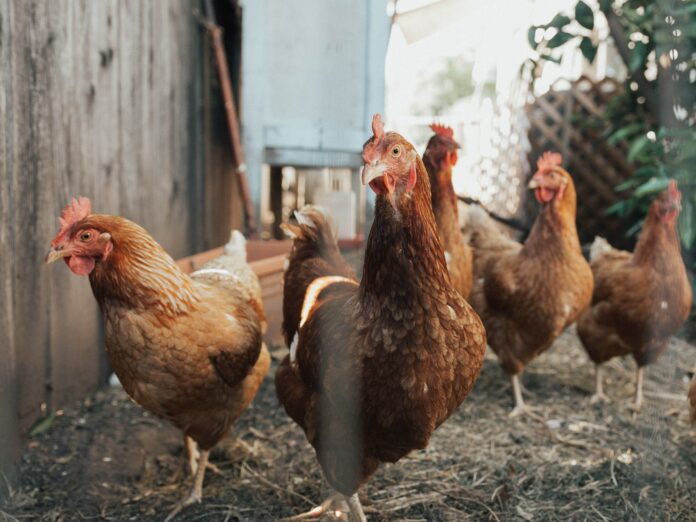Raising chickens is no longer a pastime reserved exclusively for those living in the country. More and more New Yorkers have started raising chickens in their back yards—and you may be surprised to learn how supportive New York City is of its chicken-rearing community.
Chickens and Urban Farming in NYC: A Brief History
While urban farming has been steadily gaining popularity in recent years, it is not as new a trend as you might imagine. The city’s first rooftop farm opened in 1904 on the roof of the Upper West Side’s iconic Ansonia hotel and included goats, ducks, and even a small bear—as well as five hundred chickens. Bellhops delivered fresh eggs to residents every morning, while the excess eggs were sold to the public. When the U.S. government urged citizens to establish “victory Gardens” to stave off wartime food shortages during World War II, New Yorkers planted 400,000 gardens across the city and ultimately generated over 200 million pounds of produce. Even today, the city boasts more than 600 urban community gardens.
Less than a century ago, it was common for American households to own a couple of chickens to provide fresh eggs for the family. However, as American farming became increasingly industrialized beginning in the 1950s, fewer households began keeping chickens. Still, urban chicken ownership has seen a sharp uptick in the last decade—and this trend has exploded since the onset of the Covid-19 pandemic. Connecticut-based chicken breeder My Pet Chicken reported a 260% increase in sales following March 2020, and today, there are hundreds of people across the city who proudly call themselves chicken parents.
Is it Legal to Own Chickens in NYC?
New York City has historically been very protective of its residents’ rights to own chickens. It is entirely legal to own hens in all five boroughs of New York City. However, it is unlawful to own roosters due to the disturbance caused by their crowing each morning. On the bright side, the city does not require chicken owners to obtain a license or place a limit on the number of hens you may own.
As far as the law is concerned, the most important thing for chicken owners to be mindful of is that they avoid creating “nuisance conditions” for others living nearby. If neighbors are bothered by excessive noise or odor, or become concerned about vermin infiltrating a coop, the city takes these complaints very seriously and can leverage fines of up to $2,000 against neglectful chicken owners.
New York City’s attitude toward chicken ownership stands in stark contrast to cities such as Philadelphia, where thousands of city residents keep chickens in defiance of a 2004 ordinance that makes doing so illegal. Perhaps Philadelphia lawmakers don’t realize what they’re missing out on by banning these feathery pets.
Benefits of Chicken Ownership
One of the best parts of keeping hens is that they provide a steady supply of fresh eggs: a chicken can lay up to one egg approximately every 26 hours, depending on the season and other environmental factors (egg production slows considerably during the winter). Eating home-laid eggs is better for the environment because it eliminates the need to expend fuel shipping eggs from upstate farms. In addition, you can rest easy knowing that the omelet on your plate did not come from a hen raised in cramped, inhumane factory farm conditions.
Hens are more than just producers of breakfast foods, however: they also make wonderful companions. The intelligence of a chicken rivals that of a dog, so chickens are smart enough to establish complex social dynamics among their flocks and display individual personalities and preferences. Research has even shown that chickens are capable of experiencing empathy.
Chickens can also help improve your garden. When allowed to roam free between garden beds, chickens will eagerly peck up pests such as grasshoppers, snails, and ticks. In addition, their manure can be used as a natural fertilizer. Chickens can also help your household to reduce waste by eating leftover table scraps.
Tips for First-Time Chicken Owners
If you’re intrigued by the prospect of starting your own urban chicken coop, there are a few things to know before you get started.
How Much Space Do Chickens Need?
Before buying your chickens, you must make sure you have enough room for your flock to thrive. Your chickens will spend their nights tucked away inside their coop, which should include an enclosed nesting box that offers protection from the elements. These coops should each provide four square feet of space per chicken in order to give each hen room to breathe and minimize conflict among your flock, and should also be fortified to protect against urban predators such as raccoons, hawks, and stray cats.
Ideally, your chickens should be allowed to range freely in an enclosed outdoor space such as a yard or garden during the day. If your chickens will have limited opportunities to roam, your coop size should be increased to ten square feet per hen. Smaller breeds may require slightly less room than larger ones, but it is always better to err on the side of giving your birds more space.
What Breed Should I Buy?
There are a few traits urban chicken owners prize in their hens, namely that they remain relatively small, lay eggs reliably, and possess a calm temperament. According to longtime chicken owner Janet Garman at Timber Creek Farm, a few breeds that check off all of these boxes include Buff Orphingtons, speckled Sussexes, Wyandottes, and Rhode Island Reds.
When it comes to building your flock, make sure that you’re buying your hens from a reliable and ethical source. If you’re willing to do a bit of traveling, you can visit local farms such as Long Island Poultry in Calverton, NY and pick up your chicks yourself. For those unable to make the drive, another option is a website such as My Pet Chicken. However, keep in mind that many such websites will have order minimums to ensure that the chicks can keep each other warm during transit. (For My Pet Chicken, this minimum is eight chicks during the winter and three chicks at all other times.)
What Should I Feed My Chickens?
For a first-time chicken owner, it is usually best to stick with feeding your chickens one of the many varieties of commercial chicken feed available on the market in order to ensure that they are retrieving the proper balance of nutrients to keep them in laying shape.
You can also occasionally treat your chickens to table scraps, though this should make up no more than 10% of their diet. Chickens especially love oats, unsalted popcorn, and most kinds of produce. However, you should never feed your chickens raw meat, processed foods, chocolate, avocado, rhubarb, unripe tomatoes, or raw potatoes.
Sophie McIntosh is a Brooklyn-based writer and dramaturg hailing from Sun Prairie, Wisconsin. Her plays have been produced by Imaginarium Theatre Company, Platform Production Company, and in the Boston Theater Marathon. Check out more of her work at sophiemcintoshwrites.com!



